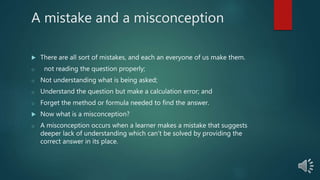What is a misconception
•
2 likes•1,672 views
We experience misconceptions and mistakes everyday in our classrooms. Let us look closely at them so that we may be able to tackle them.
Report
Share
Report
Share

Recommended
Recommended
More Related Content
What's hot
What's hot (20)
CHEM Study and CBA : Salient features, merits and demerits

CHEM Study and CBA : Salient features, merits and demerits
Role and importance of language in science Teaching

Role and importance of language in science Teaching
Similar to What is a misconception
Similar to What is a misconception (20)
Facilitating Learning/Child & Adolescent Development

Facilitating Learning/Child & Adolescent Development
2109 20 primary science school direct session 1 what is science me

2109 20 primary science school direct session 1 what is science me
2019 20 pgce session 1 what is science materials me

2019 20 pgce session 1 what is science materials me
Topic Example Dialectical Journal Directions .docx

Topic Example Dialectical Journal Directions .docx
My future position in the healthcare industry is to be a Healthcar.docx

My future position in the healthcare industry is to be a Healthcar.docx
The red coler with file are very importantAttached Files Fixedv.docx

The red coler with file are very importantAttached Files Fixedv.docx
Basic Assumptions and Theoretical Framework of Inquiry as a Teaching strategy...

Basic Assumptions and Theoretical Framework of Inquiry as a Teaching strategy...
Brain-Research, Attachment Issues and Sensory Integration(Revised).pptx

Brain-Research, Attachment Issues and Sensory Integration(Revised).pptx
More from Matshidiso Mokoena-Mokhothu
More from Matshidiso Mokoena-Mokhothu (10)
Intermediate phase natural sciences and technology

Intermediate phase natural sciences and technology
Recently uploaded
https://app.box.com/s/71kthbth9ww0fyjrppmh1p2gasinqj5zĐỀ THAM KHẢO KÌ THI TUYỂN SINH VÀO LỚP 10 MÔN TIẾNG ANH FORM 50 CÂU TRẮC NGHI...

ĐỀ THAM KHẢO KÌ THI TUYỂN SINH VÀO LỚP 10 MÔN TIẾNG ANH FORM 50 CÂU TRẮC NGHI...Nguyen Thanh Tu Collection
Recently uploaded (20)
Sternal Fractures & Dislocations - EMGuidewire Radiology Reading Room

Sternal Fractures & Dislocations - EMGuidewire Radiology Reading Room
Benefits and Challenges of OER by Shweta Babel.pptx

Benefits and Challenges of OER by Shweta Babel.pptx
Andreas Schleicher presents at the launch of What does child empowerment mean...

Andreas Schleicher presents at the launch of What does child empowerment mean...
Implanted Devices - VP Shunts: EMGuidewire's Radiology Reading Room

Implanted Devices - VP Shunts: EMGuidewire's Radiology Reading Room
II BIOSENSOR PRINCIPLE APPLICATIONS AND WORKING II

II BIOSENSOR PRINCIPLE APPLICATIONS AND WORKING II
Exploring Gemini AI and Integration with MuleSoft | MuleSoft Mysore Meetup #45

Exploring Gemini AI and Integration with MuleSoft | MuleSoft Mysore Meetup #45
Envelope of Discrepancy in Orthodontics: Enhancing Precision in Treatment

Envelope of Discrepancy in Orthodontics: Enhancing Precision in Treatment
How to Manage Closest Location in Odoo 17 Inventory

How to Manage Closest Location in Odoo 17 Inventory
The Liver & Gallbladder (Anatomy & Physiology).pptx

The Liver & Gallbladder (Anatomy & Physiology).pptx
ĐỀ THAM KHẢO KÌ THI TUYỂN SINH VÀO LỚP 10 MÔN TIẾNG ANH FORM 50 CÂU TRẮC NGHI...

ĐỀ THAM KHẢO KÌ THI TUYỂN SINH VÀO LỚP 10 MÔN TIẾNG ANH FORM 50 CÂU TRẮC NGHI...
Features of Video Calls in the Discuss Module in Odoo 17

Features of Video Calls in the Discuss Module in Odoo 17
Graduate Outcomes Presentation Slides - English (v3).pptx

Graduate Outcomes Presentation Slides - English (v3).pptx
What is a misconception
- 1. A mistake and a misconception There are all sort of mistakes, and each an everyone of us make them. o not reading the question properly; o Not understanding what is being asked; o Understand the question but make a calculation error; and o Forget the method or formula needed to find the answer. Now what is a misconception? o A misconception occurs when a learner makes a mistake that suggests deeper lack of understanding which can’t be solved by providing the correct answer in its place.
- 2. What is a misconception? A view or opinion that is incorrect Beliefs that contradict the current state of scientific evidence Conceptions in conflict with the accepted meaning incorrectness or error From a child’s perspective, it is a reasonable and viable conception based on their experiences in different contexts or in their daily life activities UNFORTUNATELY, a major source of scientific misconceptions are reinforced during the course of instruction.
- 3. Categories of misconceptions 1. Preconceived notions-when thinking about a concept in only one way. 2. Non-scientific beliefs- they are learned outside of scientific evidence 3. Conceptual misunderstanding-ideas about what one thinks they understand based on their personal experience. 4. Vernacular misconceptions-when one word has two completely different meanings. 5. Factual misconceptions- ideas or beliefs that are learnt at a young age
- 4. Where do misconceptions come from? Based on observations of the world Lack of knowledge Preconceived notions based on religious and/or cultural influences Worldview that supports a given misconception
- 5. How can misconceptions be addressed? Identify learners’ prior knowledge-Prior knowledge can impede learning Build on learners’ prior knowledge Develop your own pretest of misconceptions for your subject Focus on facts (‘Why right is right”) before you address a potential misconception Activate the misconception, i.e. why wrong is wrong. Then refute- focus on why wrong is wrong.
- 6. Natural Science and Mathematics In Natural Science –learners believe that the world is flat Children rely on their observation They are surprised to hear that the world is a sphere In Mathematics- the following misconceptions have been recorded 6² = 12; 7 X 0=7; In fractions: 1 4 > 1 2 ; 6 8 - 1 4 = 5 4
